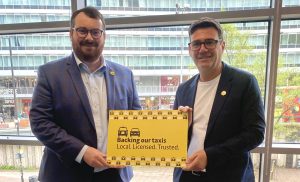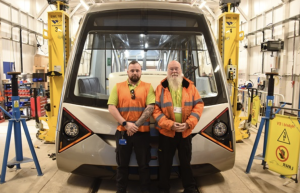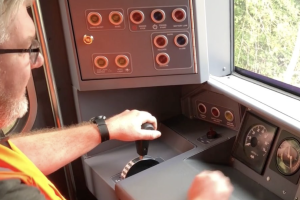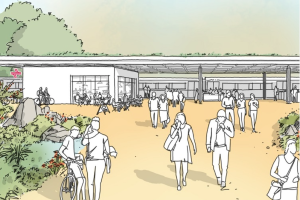Transport leaders and politicians to lobby government on £2bn rail plans
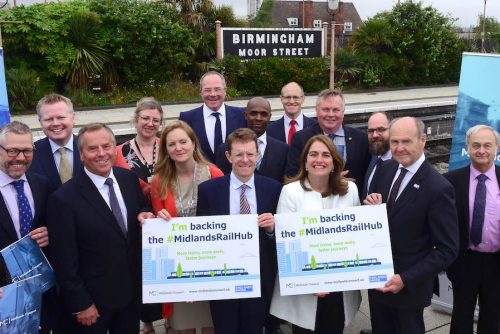
Transport leaders and politicians from across the East and West Midlands met yesterday at Birmingham’s Moor Street Station to show their joint support for the £2bn Midlands Rail Hub plans submitted to the government.
The plans were published this week by sub-national transport body Midlands Connect and, if approved, will increase rail capacity and connections throughout the two regions.
Maria Machancoses, Director of Midlands Connect, said this was the first time the two regions had come together with one voice and would now be lobbying government to ensure the visionary plans take place.
“Today is the first time we have one voice and is the result of four years’ work,” she said. “Never before have the East and West Midlands come together in such a manner and that’s because there was clear understanding that most of our national infrastructure has been focused on north south. And as important as that is, there was very little that would enable the Midlands to connect better.
“It is extremely important to get to this stage. Right from the outset there was a clear understanding that the Midlands was punching below its weight when it came to making the case for investment in infrastructure.
“We feel confident we have all the answers to all the questions, and we need the support of government so we can take it to the next level so we can have specific designs on the different interventions we are proposing. Otherwise nothing will happen.”
With the working title of the Midlands Rail Hub, the package outlines plans to build 15 sets of new and improved infrastructure, which it says, can be completed in phases between 2024 and 2033.
Potential Improvements include direct services between Coventry, Leicester and Nottingham reinstated for the first time since 2004, with two trains per hour in each direction
Two extra trains per hour to and from Birmingham to Derby, Birmingham to Leicester and Birmingham to Kings Norton via the Camp Hill Line (serving the Birmingham suburbs of Hazelwell, Kings Heath & Moseley).
West Midlands Mayor, Andy Street said the system needed investment and Moor Street was perfectly positioned to increase capacity in the city and connect with the HS2 terminal.
“It is literally a short walk from HS2 terminal station, which I’m definitely confident will happen, the digging is already going on, but we’ve got to keep making the case,” he said.
“We’re making some short-term investments which people will have seen with the increase in trains and timetable changes and we are busy getting planning permission for the Camp Hill line in south Birmingham and also the Walsall to Wolverhampton line.
“But this is about a really big infrastructure improvements that give us much more capacity including 24 more trains an hour into central Birmingham and restoring the direct link between Coventry and Leicester for example.
“We are looking at ultimately £2bn from central government and what I’ve got to do is make the case to them, alongside Midlands Connect and the Midlands Engine that this is really good value for money.”
In the 24-page report: Midlands Rail Hub The case for transformational investment in the region’s rail network, it states that in the past two years, rail usage in the Midlands has grown faster than anywhere else in the UK, with passenger numbers in the West Midlands growing by 121% in the last decade.
“We know it will drive our economy and it’s a good time to be making the case to central government given the political changes and of course if you consider the investment they are making with Cross Rail in London and what the Northern Powerhouse are asking for, this is actually a reasonable request for a successful part of the country’s economy and that’s why we will eventually win through,” added Street.
The report also says that without investment, the region’s rail network can’t keep pace with this record demand, while many services between major towns and cities in the Midlands remain slow and infrequent. Birmingham New Street, the busiest station outside London, is close to capacity.
Sir John Peace, Chair of Midlands Connect and the Midlands Engine, said there had been decades of underinvestment by successive governments.
“In many ways what you see now is playing catch up and we need to invest in our infrastructure,” he said.
“All the planning has been done here by Midlands Connect, so we are local and know what’s needed. We can relate to the public needs directly and we have submitted our proposals to government, and we are going to be working very hard over the coming months to try and get the plans approved in the spending review when that happens later this year.
“Government will look at this as part of the spending review, which will go beyond the autumn and to the end of the year and what they will see is the Midlands coming together, east and west, businesses and political leaders, and hopefully this will make them listen.”
Malcolm Holmes, Executive Director, West Midlands Rail Executive and Director of Rail, Transport for West Midlands gave a stark warning to government about the knock-on effects of not going ahead with the plans.
“If this doesn’t happen, the constraints on the rail network today, which is very constrained, will just get worse and worse and we’ll get to the point where crowding can’t be relieved by putting extra carriages on and we can’t get any more trains onto the network,” he said.
“We’re at the crossroads of the rail network here at the centre of the country, so major inter-city routes coalesce with local routes so having no investment has a major knock on effect and means services can’t expand elsewhere.”
As part of the ongoing discussions from now until the autumn, Midland Connect and its 47 partners are on standby to answer direct questions from government, including Network Rail.
“Network Rail’s role in these plans has been to see what’s logistically possible and how that would work with customers in terms of the services they would be offered and what it would cost,” said Tim Shoveller, Regional Managing Director, North West & Central, Network Rail.
“The business case that’s been presented here is of course much more than transport elements but many more economic effects. We will be supporting any refinements that need to be made and looking if there are ways of doing it better.”


